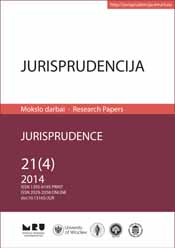NEFORMALUS BAUDŽIAMOJO ĮSTATYMO TAIKYMAS: POREIKIS, RIBOS, DOKTRINOS
INFORMAL APPLICATION OF CRIMINAL LAW: DEMAND, LIMITS, DOCTRINES
Author(s): Oleg FedosiukSubject(s): Law, Constitution, Jurisprudence
Published by: Mykolas Romeris University
Keywords: informal application of criminal law; interpretation of law; dangerousness of criminal act; criminal law as a last resort; protection of human rights.
Summary/Abstract: This article examines the issues of the need and opportunities for informal (thoughtful, reasonable, creative) application of the criminal law. The problem is closely related to the legal discussion on the limits of discretion of the judge in the interpretation and application of laws. The author expresses the opinion that despite the fact that the influence of legal positivism on criminal justice is stronger than on civil one, but even in a criminal case the judge does not have to be completely restrained by the letter of law. The paper justifies the need for an informal application of the criminal law, discusses the legal doctrines that allow it to do so. Beyond doubt, the compliance with the letter of law is a desirable standard in criminal justice. Nullum crimen nulla poena sine lege (no crime and punishment without law) principle is a fundamental basis of criminal law, which protects citizens from arbitrary prosecution and brings clarity to what is a crime in society and what legal consequences are foreseen to the offender. However, the need for informal application of the criminal law actually exists. The main objective reason for informal justice is eternal incompleteness of law, limited opportunities of written rules, diversity of life, which never fits into dry definitions. Even the criminal law always risks falling behind changing realities, not to respond in time to changes, misunderstand them, create uncertainty and conflicts of values. The subjective reason for informal application of criminal law is surplus, clarity and consistency strapped legislation, which often produces irrational, abstract and limitless definitions of particular crimes. These definitions later become the means to formulate excess criminal charges for minor infringements and artificially criminalize relations regulated by other branches of law (tax, administrative, civil, etc.). So, the need of informal application of the criminal law is primarily related with the need to avoid artificial criminalization and absurd criminal convictions. The author distinguishes the following working legal instruments allowing informally apply the criminal law: 1) expansive and narrowing interpretation of criminal law; 2) the concept of dangerousness of criminal act; 3) the general legal principle of proportionality and the principle of criminal law as a last resort (lat. ultima ratio); 4) the maxim of human rights protection. The paper illustrates the effectiveness of these concepts with concrete examples of court practice.
Journal: Jurisprudencija
- Issue Year: 21/2014
- Issue No: 4
- Page Range: 1079-1100
- Page Count: 22
- Language: Lithuanian

